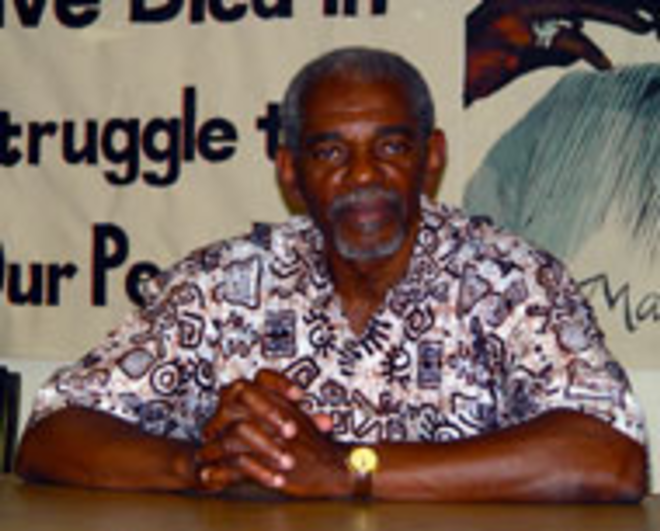
Eight months after the 1996 riots, the University of South Florida-St. Petersburg hired me to work with the city and the affected neighborhoods. I had never met Omali Yeshitela or anyone from his International People's Democratic Uhuru Movement, but the impression I had from the media was that he was a radical thug who had caused the riots. I know that people are often much different than how they are portrayed in the media, but when I starting talking with Yeshitela in 1997 I was stunned by the disconnect between what he was saying and what I was reading. For example, the local media never reported (until now) that when the riots surrounding the police killing of TyRon Lewis occurred on Oct. 24, 1996, Yeshitela was in Oakland, Calif., and did not return to St. Petersburg until Oct. 27. The media never reported that while Yeshitela is not a pacifist — like George Washington, Abraham Lincoln and Ronald Reagan, he believes democracy, freedom and justice are worth physically fighting for — he and the Uhuru Movement do not use or advocate violence to achieve their political and economic goals. The media had also underreported the Uhuru Movement's anti-drug, pro-family, pro-education and physical fitness programs.
When a new round of disturbances occurred in St. Petersburg on May 12, I was again struck by the disconnect between media reports of Yeshitela's role and what I was hearing and seeing on the streets. Democracy requires a big tent, the willingness to hear and honestly engage different perspectives, and news media that help citizens access complete and accurate information.
The Uhuru Movement's perspective on what happened May 12 has not yet been told (until now).
Omali Yeshitela went home late that Wednesday afternoon, hoping to get some sleep. He had been working intensely for two days assisting the TyRon Lewis family and attorneys in their civil suit against the city, and facilitating back-channel negotiations between city representatives and the family in a failed attempt to find a compromise.Yeshitela and his city contact were concerned that a trial less than two weeks after sheriff's deputies had killed another black teenager, Marquell McCullough, under similar circumstances was asking for trouble. But they were given only two days' notice before the trial was to begin, and the family's emotions combined with the city's internal politics were proving difficult to overcome. By Wednesday evening Yeshitela and his contact agreed to step back and take a break.
Every Wednesday and Friday night the Uhuru Movement organizes informational demonstrations in St. Petersburg, "sorta like street theater," Yeshitela said last week in an interview at his St. Petersburg office on 18th Avenue and 12th Street S. Friday nights are at BayWalk and focus on how the complex treats black youth, and Wednesdays occur in various St. Pete black neighborhoods and stress the need for more economic development in those neighborhoods.
Yeshitela did not expect this Wednesday night to be eventful. "I didn't even go to the meeting on Wednesday," Yeshitela said, "and then I started getting phone calls saying the cops were out."
About two weeks prior to May 12, Yeshitela says the Uhuru Movement started getting two to three complaints a day from black residents about increased police surveillance and harassment. He did not know the TyRon Lewis civil suit was going to start in two weeks, but in hindsight Yeshitela thinks the city did and the police were preemptively clamping down. "They were stopping folks and asking, 'Are you going to start a riot?' It was bizarre," Yeshitela said, "and we were perplexed."
Tensions were building, and Yeshitela had no idea why. "They had lit the fuse and we don't know the damn fuse is lit because nobody is talking to us."
St. Petersburg Police Department Major Tim Story confirmed that the city's lawyers had notified the department "weeks in advance" that the Lewis trial was upcoming and that officers were on "heightened awareness." But Story denied the department made any "intentional" changes in their policing practices. Story also confirmed that the department heard some black residents were complaining about more aggressive policing in the weeks leading up to the trial.
After their regular 6:30 p.m. meeting on the 12th, seven Uhuru Movement members began to march through the neighborhood behind their 18th Avenue S. headquarters, and then started up 18th Avenue toward 16th Street. They hadn't gotten more than two blocks from their building when the crowd started to swell dramatically.
A local high school basketball star, who asked not to be identified, was one of the original seven marchers. "People often come out from their homes to join us," she said, "but this night was different. People were angry about Marquell McCullough being killed and the recent increases in police harassment. Kids were on their cell phones telling their friends 'it's on, it's on,' and people were coming from everywhere. Our bullhorns were soon useless because the crowd was so large and angry. We tried to get them to go back to the Uhuru house but we couldn't. As soon as we saw someone pick up a brick, we got out of there."














